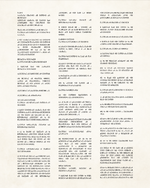IIWiki:Today's featured article: Difference between revisions
(March 2021 Update) |
(July 2024 Update) |
||
| (46 intermediate revisions by 3 users not shown) | |||
| Line 1: | Line 1: | ||
<div style="float:left;margin:0.5em 0.9em 0.4em 0;">[[File: | <div style="float:left;margin:0.5em 0.9em 0.4em 0;">[[File:Talaharan Constitution Sample.png|150px]]</div> The '''Supreme Consensus of Talahara''' ({{wp|Central Atlas Tamazight|Takelat}}: ⴰⵎⵙⴻⴼⵀⴰⵎ ⴰⵄⵍⴰⵢⴻⵏ ⵏ ⵜⴰⵍⴰⵀⴰⵔⴰ; ''Amsefham Aɛlayen n Talahara'') is the constitution of the [[Talahara|United Communes of Talahara]]. Drafted over a period of three years between 1838 and 1841, the first two parts of the Supreme Consensus enshrined the rights and freedoms of all persons in Talahara, in addition to democratic and usufructary rights. Part three of the Supreme Consensus was completed later in 1841 and codified the roles of the three branches of government and divisions of power between national, regional, and communal levels of government. Both laws created by the [[Supreme Legislative Council (Talahara)|Legislative Councils of Talahara]] and the executive functions of government must abide by the protections and limitations enshrined by the Supreme Consensus. Constitutional principles are also used alongside Talaharan customary legal principles to interpret laws. The Supreme Consensus has been amended a total of four times. These amendments include the addition of the third part, electoral reform, and the addition of new rights and protections. Constitutional amendments require the passage of a provision by a two-thirds supermajority in the Supreme Legislative Council (34 of 50 members) and subsequent ratification by a two-thirds supermajority by the membership of the 1,250 Communal Legislative Councils in Talahara (8,334 of 12,500 members). ('''[[Supreme Consensus of Talahara|See more...]]''') | ||
<div align="right"> | <div align="right"> | ||
'''<span class="plainlinks">[https://iiwiki.us/mediawiki/index.php?title=IIWiki_talk:Today%27s_featured_article&action=edit Suggest a Featured Article]</span>''' • '''[[IIWiki:Featured articles|See previous Featured Articles]]'''</div><noinclude> | '''<span class="plainlinks">[https://iiwiki.us/mediawiki/index.php?title=IIWiki_talk:Today%27s_featured_article&action=edit§ion=new Suggest a Featured Article]</span>''' • '''[[IIWiki:Featured articles|See previous Featured Articles]]'''</div><noinclude> | ||
Latest revision as of 01:03, 10 July 2024
The Supreme Consensus of Talahara (Takelat: ⴰⵎⵙⴻⴼⵀⴰⵎ ⴰⵄⵍⴰⵢⴻⵏ ⵏ ⵜⴰⵍⴰⵀⴰⵔⴰ; Amsefham Aɛlayen n Talahara) is the constitution of the United Communes of Talahara. Drafted over a period of three years between 1838 and 1841, the first two parts of the Supreme Consensus enshrined the rights and freedoms of all persons in Talahara, in addition to democratic and usufructary rights. Part three of the Supreme Consensus was completed later in 1841 and codified the roles of the three branches of government and divisions of power between national, regional, and communal levels of government. Both laws created by the Legislative Councils of Talahara and the executive functions of government must abide by the protections and limitations enshrined by the Supreme Consensus. Constitutional principles are also used alongside Talaharan customary legal principles to interpret laws. The Supreme Consensus has been amended a total of four times. These amendments include the addition of the third part, electoral reform, and the addition of new rights and protections. Constitutional amendments require the passage of a provision by a two-thirds supermajority in the Supreme Legislative Council (34 of 50 members) and subsequent ratification by a two-thirds supermajority by the membership of the 1,250 Communal Legislative Councils in Talahara (8,334 of 12,500 members). (See more...)
KEEP THIS ONE PARAGRAPH IN LENGTH so it doesn't push the main page section down below the other section.
